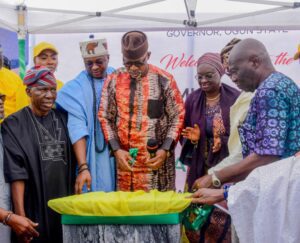
Building collapse: Ogun’s materials testing laboratories
By: Ajibola Taiwo
In the recent past, the media have been awash with news of collapsed buildings across the country. Devastations caused by these incessant collapses are not limited to material and financial losses, but even the ultimate loss of human lives, which should be avoided at all cost. If only one life was lost to building collapse, it is one too many. Sadly, more often than not, many lives are lost to these avoidable catastrophes. What are the major causes of building collapse?
Professionals have identified poor construction methodology, substandard/poor quality building inputs and poor workmanship as the three leading causes, which show that barring natural disasters, the bulk of the responsibility for the structural integrity of any building lies with human beings involved in handling it and the decisions they take before, during and after construction.
In Nigeria, many people assume that once you purchase land, all that is needed is to employ the services of artisans to commence building. Findings show that a portion of the population disdain the need for professional involvement or quality assurance and/or control mechanisms in erecting their buildings, either through ignorance or the assumption that they can design and supervise their projects themselves. Little wonder the high number of haphazard developments with no consideration for functionality, safety or aesthetics, that litter many communities.
Human beings have been estimated to spend about 90 per cent of their existence in buildings, be it homes, offices, places of worship or even recreational centres. As such, the quality of buildings must not be compromised by any government that holds the protection of lives and property of its populace in high esteem.
This must be the rationale behind the accreditation and registration exercise embarked upon by the Ministry of Physical Planning and Urban Development for material testing laboratories in the state. The laboratories, designed to offer quality assessment and quality control to the built industry, are charged with the responsibility of conducting pre-tests, on-going tests and post-test for buildings and roads, all in a bid to ensure that the materials used in any construction work meet international best construction practices standard. Through Ogun State Building Production Management Authority (OGBPMA), one of the three agencies of the Ministry, three material testing laboratories have been accredited and registered so far in the State. These are Moshood Abiola Polytechnic, Abeokuta; Federal Polytechnic, Ilaro and the Ogun State Material Testing Laboratory in Abeokuta.
There are series of pre-tests before commencement of construction of any building. The soil test, for instance, checks the different depths of the land to determine the best combination of materials (water, concrete and sand) needed for the foundation work. This test is essential to determine the bearing capacity of the land, that is, if the land can carry the load of the proposed building, such that the combination of materials to erect a building in a marshland is different from that required for a rocky location. The test also takes into consideration the fact that a building structure settles every 10 years, and ensures that the technicalities involved in building are designed to accommodate that from the outset.
Furthermore, it is essential that the process of manufacturing building materials adhere to standard, which is why tests are also conducted during the construction period. The water used in mixing the concrete must be tested to ascertain the measure of acidity or alkalinity (pH level) for optimal bonding of the concrete; while the ratio of mixture of cement to sand (fine and coarse aggregate) to water is also essential towards achieving the workability of the concrete for the building. Physical and Chemical tests on the cements are conducted to determine setting time, soundness and fitness, while tensile strength on reinforcement steel bars determine yield stress, optimum stress and percentage elongation.
It is also important to note the possibility of testing buildings that have already been erected in a non-invasive technique. The results of such tests are often reactionary rather than preventive, but even at that, such tests can make the difference between collapse and longevity.
Why is it essential that Nigerians take the issue of regulation and quality control in the built sector seriously? Adhering to the testing and regulatory stipulations in the sector will not only serve as a preventive measure towards curtailing incidences of building collapse, but would also provide government with adequate information about structures, both old and new.
This information will create a database essential for planning and implementation of developmental policies, programmes and actions, relevant during and/or beyond periods of crises or natural disasters.
By going through the process, from the pre-tests to the final test, the owners of the building can also be sure that their structures will stand the test of time, and not become distressed after a few years of construction.
Moreover, going through the process will serve as a means of educating the owners on how to maintain their buildings to get the best out of them, while the propensity for job creation in this sector remains high if and when Nigerians begin to fully appreciate and involve the services of the laboratory.
On the other hand, is the issue of workmanship. In a lot of instances, artisans with no form of training beyond years of informal apprenticeship and experience, are handed the sacred responsibility of holding people’s lives in their hands. How? You might ask.
A large per cent of artisans in the informal sector do not have the basic working knowledge of why certain measurements must be adhered to, or why certain rules should be followed. They often rely on their discretion, gut feelings, estimation and intuition to make decisions that should have been made from a position of scientific and engineering precision. Such decisions, in the long run, can constitute a problem if it leads to building distress, or worse still, loss of lives and property through building collapse.
However, many find it cheaper to patronize informal artisans as they are found to be more affordable than their formal colleagues. For years, our society has operated like this, and the result is what is being experienced by the notably high rate of building collapse recorded in recent years.
To address the challenge of workmanship, regular training and sensitization activities have been introduced by Ogun State Government for the sole purpose of improving the capacity of these important members of the built sector. From the block moulders to bricklayers, carpenters to welders, all cadres of professionals involved in erecting any given structure must receive constant training to keep abreast of prevailing trends, realities and development in the sector. Through Ogun State Building Production Management Authority, Ogun State Government continues to explore this avenue to create and maintain sustainable towns and communities.
While such services cannot be offered free of charge, the determinants for charges depends on variables such as type/use of building. i.e. private, residential, commercial or industrial; number of floors; and size of structure, among others. Yet, paying a stipend to prevent the potential for future loss is an investment that many smart individuals and societies are willing to pay for sustainability and protection of the citizenry.
What’s more? There appears to be an opportunity for private concerns to establish material testing labs at the different Local Government Areas of the state, such that the services can have a wider coverage and better accessibility. This will, of course, require accreditation and registration with the Ministry of Physical Planning and Urban Development, but the availability of such services will ensure that future developments adhere to strict building regulations, regardless of whether the developments are in rural or urban areas.
Creating a functional, sustainable and aesthetically-pleasing society is not the responsibility of government alone. Individuals, organisations and commercial entities also have their own roles to play towards ensuring that our society becomes one that all its inhabitants can be safe in, and be proud of.
Indeed, the developed countries we like to cite as references all ensure strict regulations of their built sector, even in places tagged as general population housing units, and many Nigerians visit these places and adhere to their rules. It is only right that we do not resist the change that is necessary for growth and development to be effected in our own country.
Taiwo, is an Information Officer, Ogun State Ministry of Physical Planning and Urban Development.
Can be reached via [email protected]. or 08063851859.



